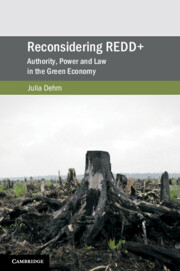Book contents
- Reconsidering REDD+
- Cambridge Studies on Environment, Energy and Natural Resources Governance
- Reconsidering REDD+
- Copyright page
- Contents
- Acknowledgements
- Abbreviations
- Introduction
- 1 Background to REDD+
- 2 Asserting Global Authority over the Carbon Sequestration Potential of Forests
- 3 Actualising Authority through Public and Private Law
- 4 Responsibility and Capacity
- 5 Scale, Multilevel Governance and the Disaggregation of Property Rights in REDD+
- 6 REDD+ at the ‘Local’ Level
- 7 Conclusion
- Bibliography
- Index
7 - Conclusion
Possibilities for Climate Justice and Planetary Co-habitation
Published online by Cambridge University Press: 13 May 2021
- Reconsidering REDD+
- Cambridge Studies on Environment, Energy and Natural Resources Governance
- Reconsidering REDD+
- Copyright page
- Contents
- Acknowledgements
- Abbreviations
- Introduction
- 1 Background to REDD+
- 2 Asserting Global Authority over the Carbon Sequestration Potential of Forests
- 3 Actualising Authority through Public and Private Law
- 4 Responsibility and Capacity
- 5 Scale, Multilevel Governance and the Disaggregation of Property Rights in REDD+
- 6 REDD+ at the ‘Local’ Level
- 7 Conclusion
- Bibliography
- Index
Summary
The conclusion rearticulates the book's analysis and critique of how REDD+ brings forests within international financial flows by commodifying the sequestered carbon emissions saved from avoided deforestation or other forms of forest degradation in the Global South; and by potentially allowing ‘saved’ emissions to be used as an ‘offset’ towards the GHG reduction targets of the Global North. In these processes, new claims to international authority have been authorised and articulated, although these remain in many ways provisional and aspirational. It describes forests both materially and metaphorically as productive sites for the examination of questions of authority and the process of authorisation, because they have physically and symbolically been sites of contested authority. In closing, it gestures towards other possible ways we could live in and with nature, how we could live in relation with one another and how we could form worlds and our place in them.
- Type
- Chapter
- Information
- Reconsidering REDD+Authority, Power and Law in the Green Economy, pp. 351 - 356Publisher: Cambridge University PressPrint publication year: 2021

